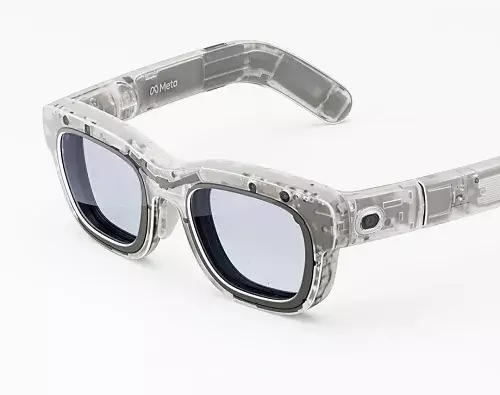In the rapidly evolving landscape of augmented reality (AR), Meta has sparked intrigue with its ambitious project: the Orion AR glasses. Although a consumer launch isn’t expected until 2027, recent insights reveal remarkable strides that Meta is taking to redefine the future of personal computing. Unlike traditional tech milestones, which often come draped in mystery and hype, Meta has chosen a more transparent route by sharing design notes and technological advances on its platform, Threads. This approach not only generates excitement but also invites public scrutiny, positioning Meta as a forerunner in the AR space.
At the core of the Orion development is an innovative design philosophy focusing on user experience, practicality, and aesthetic appeal. This is notably reflected in the addition of a “puck” function, designed to optimize processing capabilities and battery life. By offloading computing resources from the glasses themselves, Meta aims to create a sleeker and more user-friendly product, addressing the longstanding issue of bulkiness in AR devices. Yet, despite enhancements, the current prototypes still exhibit a size that isn’t exactly pocket-friendly, an obstacle Meta appears committed to overcoming.
A Competition with Established Rivals
The AR market is fiercely competitive, with industry giants like Apple stepping into the arena with their VisionPro device priced at a staggering $3,499. Meta’s CEO, Mark Zuckerberg, takes a critical stance against such high pricing, fearing that it could stifle mass adoption of transformative technology. He advocates for a more accessible price point comparable to that of a modern smartphone, an aim that signifies a bold departure from the elite pricing strategies of competitors who may have been content to target only the affluent tech-savvy audience.
In his view, widespread adoption is crucial for the AR ecosystem to flourish, as it opens up opportunities for Meta to monetize through advertising and specialized features once the market is established. This vision underscores a fundamental shift from viewing AR merely as an accessory toward recognizing it as an essential tool that can integrate seamlessly into daily life.
The Integration of Artificial Intelligence
Another transformative aspect of the Orion AR glasses is the incorporation of artificial intelligence. Arguably, this is not just a trendy afterthought—it’s an essential ingredient for creating a device that resonates with contemporary tech users. AI enhances the glasses’ interactivity and functionality, allowing for features like voice recognition, real-time translations, and contextual overlays that significantly elevate the user experience. In essence, AI could pivot the Orion glasses into indispensable companions for everything from navigation to tasks like shopping and communication.
This strategic emphasis on AI is particularly prescient, as it aligns with broader technological trends emphasizing personalization and predictive analytics. While other companies may still be grappling with basic functionalities, Meta appears to be crafting an advanced toolkit that anticipates the needs of future users. This is not merely about wearing a gadget; it’s about melding technology into the fabric of our daily interactions.
Challenges on the Horizon
However, challenges remain on this ambitious journey. Supply chain complexities, exacerbated by current geopolitical tensions, could hinder Meta’s efforts to procure affordable materials, impacting overall pricing strategies. The global trade environment necessitates a careful balancing act: while pursuing affordability, there’s an ever-present risk of compromising quality, which could alienate early adopters who expect top-notch performance.
Furthermore, the potential expansion of advertising and subscription models raises ethical questions—will the glasses serve users’ needs or become instruments of incessant marketing? Meta must tread carefully in this realm to foster genuine user trust, especially as public sentiment towards data privacy continues to evolve.
While the horizon for Meta’s Orion AR glasses remains dotted with uncertainty, one thing stands clear: the potential for disrupting how we interact with the world is immense. If Meta can successfully navigate the myriad challenges ahead, it could indeed lay the groundwork for the next technological paradigm shift, shifting our relationship not only with devices but also with reality itself. The journey ahead is fraught with possibilities, and the stakes are higher than ever.

